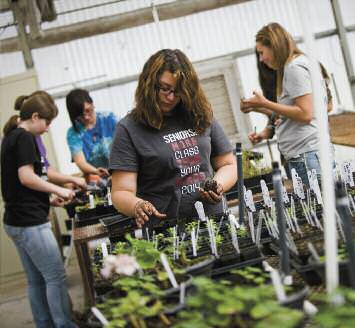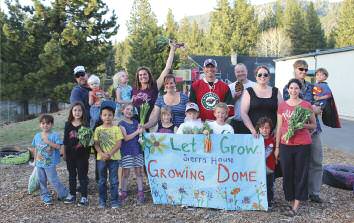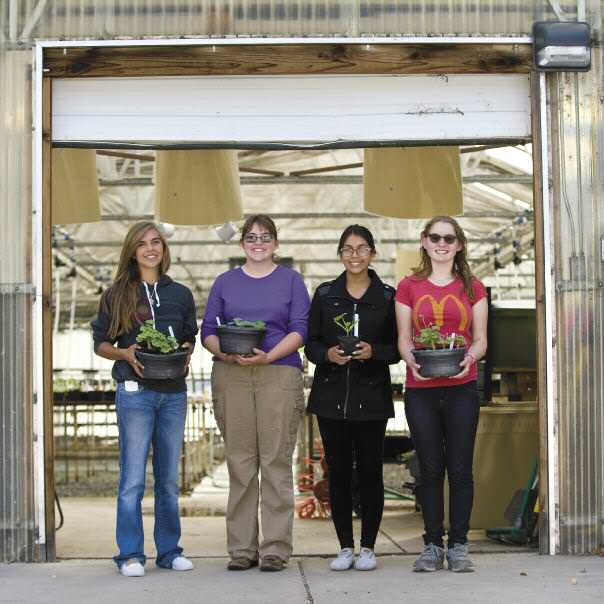feature
GREENHOUSE EDUCATION
Indoor agriculture is becoming prevalent in local schools.
WRITTEN BY ERIN MEYERING
PHOTOS BY CANDICE NYANDO AND COURTESY OF THE DESERT RESEARCH INSTITUTE
The school bell rings, signaling the start of the day. Instead of filing inside to their desks, some children and their teachers head to the greenhouse to grow and learn.
Teachers all over Reno-Tahoe are merging often tough and time-pressured curriculum standards related to math, writing, business, and science lessons with agriculture. And more are incorporating greenhouses and other gardening buildings into their programs.
Grow domes
Educators and parents of students at Sierra House Elementary, in South Lake Tahoe — determined to continue their school’s themes of health, fitness, and mountain sports — are examples of this growing movement. They installed two geodesic domes at the school through their Sierra House Growing Dome Project in mid-November 2014. As of that time, project leaders had raised $119,009 (of a desired $140,000) through grants and donations to purchase, install, and maintain the structures.
The domes — nicely suited for alpine climates such as Tahoe’s — are four-season, energy-efficient, self-heating edifices, which will allow students to harvest naturally grown and nutritious vegetables and herbs year round. The organizers’ main goals are to supplement school lunches, create a small farm stand, and simply enhance education.
“I see a difference when kids learn firsthand,” says Michelle McLean, a parent of a Sierra House Elementary student, member of the Lake Tahoe Sustainability Collaborative’s Human Health and Social Well-Being Committee, and (along with Rebecca Bryson), co-project leader for the domes.
McLean says she has noticed that students become more engaged and responsible when they participate in this learning platform.

Wooster project
Urban Roots, a Reno nonprofit that promotes youths’ (and adults’) food education, wrote a $13,600 Nevada Department of Agriculture grant for the Earl Wooster High School growing project. A partner with the Desert Research Institute’s GreenPower K-12 Initiative, Urban Roots helped arrange for leading hydroponics scientist Nina Fedoroff to visit Wooster’s Reno campus in 2013.
Fedoroff received the 2013 DRI Nevada Medal, the state’s highest scientific award, which honors individuals working in science or engineering whose prominent research contributions have advanced our knowledge across the globe. Fedoroff was honored for her achievements in studying plant microbiology and developing techniques to solve agricultural challenges, including hydroponics. Upon receiving her $20,000 award, she donated half of it to Wooster High School to allow students to continue working in and improving the hydroponics lab.
“The idea behind the grant was to introduce kids to research options in agriculture,” says Jeff Bryant, Urban Roots’ executive director.
The lab is set up for both hydroponics production, which uses mineral solutions in water without using soil, and aquaponics, which uses fish waste to supply nutrients to plants grown hydroponically. Students are using the two methods to see how different varieties of lettuce grow and thrive during the season.
“It’s given them a real-life education,” says Leah Keuscher, Wooster’s principal.
After data are collected, the kids have salad parties to sample the food they helped grow from seed to salad. Keuscher says that, in the future, school leaders would like students in the entrepreneurship and technology programs to sell their microgreens to local restaurants. She says the program could be supported through funds generated from selling the greens.

Double the produce
Academy of Arts, Careers, and Technology students run two greenhouses, one on the AACT campus and one on another Washoe County School District property. The Reno students are enrolled in plant science/horticulture classes, along with greenhouse management, and are working toward creating and operating a farm stand with the help of Urban Roots leaders.
Currently, the greenhouse supports hydroponic systems with two 400-gallon fish tanks. The students help with the full process of planning and planting. Plants grown support the school’s annual sale in May, and school’s culinary program even uses some of the herbs, tomatoes, and peppers.
“We’d like to have community events that our students run, and help teach community members about food production and where their food comes from,” says Michelle Burrows, AACT’s agriculture teacher.
In addition to growing produce, AACT students grow and sell a variety of flowers. The public can order flower arrangements that are grown, designed, and created by the students. This spring, the students will develop a cut-flower community-supported agriculture program as part of the floriculture program.
Erin Meyering loves that so many schools are finding ways to include agriculture in their curriculum. Although she didn’t have the opportunity to be involved with an agriculture program in school, she strives to keep learning about agriculture.
Resources
You may contribute to the Sierra House Growing Dome Project. For details, visit http://www.Classy.org/events/let-it-grow/e32664. For details about the dome or to donate, visit http://www.Growingspaces.com or email Tahoedomes@gmail.com.
Mini hydroponics
Portable growing boxes are available to local schools.
GreenPower, a DRI initiative, has partnered with Urban Roots to create a hydroponics Green Box: a portable hydroponics system and curriculum for Nevada K-12 schools. The kits contain basic tools for creating a hydroponic classroom lab and is free for teachers, including postage. Teachers may use the contents for two to eight weeks to integrate math, science, and writing into their curriculum, but must attend an Urban Roots training and learn about hydroponics setup and maintenance. For details, contact Jeff Bryant at Jeff@urgc.org.


